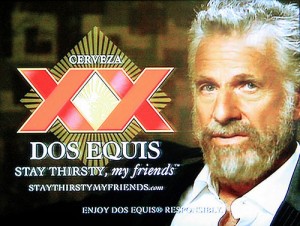In 2006, Dos Equis established character of “The Most Interesting Man In The World” in their advertising campaigns. This man, played by Jonathan Goldsmith, depicts a suave elderly gentleman who has accomplished daring feats and finishes the advertisement with ‘I don’t always drink, but when I do, it’s Dos Equis’.
A few years later one can find this phrase reformatted for a plethora of posts across social networks and image sharing sites as it has grown to a running joke across internet, known as a meme. The format of “I don’t always [x], but when I do I [y]” is used to describe tendencies between two activities in a humorous manor. When displayed as an image the phrase is accompanied by The Most Interesting Man.
Is this a sign of successful marketing? The Most Interesting Man campaign has been going on for six years now, and Dos Equis sales went up 22% while the rest of imported beers went down 4%. While the numbers are promising one what must take into consideration how the use of the phrase has transcended the advertising campaign itself. Many people could have no idea the back story behind the jokes they scroll past, or the opposite could occur in that they’re exhausted by the repeating sentence structure.
The true sign of good marketing is getting into the audience’s headspace. By inserting an idea into a customer’s imagination, an advertisement becomes part of their thought processes and eventually their lifestyle. The customer then associates with the product unknowingly and will relate to it without question.
Hands down, The Most Interesting Man in the World has entered the audiences headspace. The fact that hundreds of internet users re-type out the phrase, perhaps unknowing of what it relates to, shows that the idea of The Man has a positive, witty connotation. A consumer who knows the phrase will eventually see the advertisement and associate the beer with all the jests they’ve read in the same format. Every time someone impersonates The Man, they bring themselves closer to Dos Equis.



